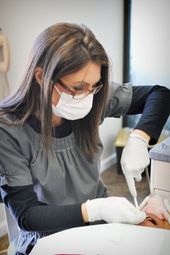
When dental problems can’t be resolved through standard fillings or root canal therapy, oral surgery may be necessary. Performed by trained specialists, these procedures are used to help relieve pain and restore smiles. However, they do require a few steps that are different than your average dental appointment. If you’re in need of oral surgery, here are a few basic details you can expect from your professional care.
A Simple Guide to Oral Surgery
Consultation
Before the procedure, you will meet with your dentist or oral surgeon to review your condition and possible treatment options. Once treatment is decided, your specialist will outline the steps of the surgery, what it should achieve, and the risks involved. You may also be given instructions on how to prepare for the treatment, as well as recovery.
Preparation
To prepare for surgery, you may be asked to start a course of antibiotics to prevent infections from spreading. Depending on the type of sedation you need, you may also need to fast during the day of the procedure and arrange a ride after the appointment.
Procedure
 Once you check-in for your appointment, you’ll move to the treatment area and get prepped for surgery. Depending on your comfort preferences and the needs of the procedure, you may be given general anesthesia to help you lose consciousness so you are unable to feel pain during surgery.
Once you check-in for your appointment, you’ll move to the treatment area and get prepped for surgery. Depending on your comfort preferences and the needs of the procedure, you may be given general anesthesia to help you lose consciousness so you are unable to feel pain during surgery.
If you are conscious throughout the procedure, a local anesthetic will be provided to numb the area, and sedatives may be given to help you relax. Under these options, you should not feel any pain, but you may still experience a few minor sensations throughout surgery.
Recovery
If you took sedatives or had general anesthesia, you will spend some time in a recovery room until the medication wears off. When you return home, you should follow all after care instructions, which may include rest, the use of pain medications, rinsing, and a gentle diet.
In the following days and weeks, you will slowly regain full use of your mouth but may experience some discomfort along the way. To prevent infection and dry sockets, it is important that you continue to clean and rinse as instructed.
Follow-Up
You may be instructed to visit your specialist in the weeks after the procedure for a follow-up. Essentially, these visits are to make sure the surgical site is healing well and that the procedure was successful.
If you’re looking to simplify your oral surgery experience, turn to the specialists at Magnolia Dental in Waynesboro, VA. As a leading family dental care provider, this clinic offers the experience and advanced resources necessary to successfully perform many vital procedures—including tooth extraction and dental implants. Visit this dental office online to learn more about their comprehensive services, or call (540) 943-2723 to schedule an appointment with a trusted specialist.
About the Business
Have a question? Ask the experts!
Send your question

